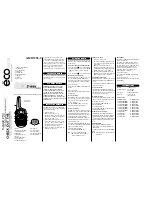
FCC ID: K66VX-5500V-2
Alignment
3/4
Vertex Standard Co., Ltd.
Alignment Channel Frequencies
Channel
Frequency
(simplex)
CTCSS
Encode
DCS
Encode
Narrow
/wide
CH1
134.01MHz
None
None
Wide
CH2
147.01MHz
None
None
Wide
CH3
159.99MHz
None
None
Wide
CH4
134.01MHz
None
None
Narrow
CH5
147.01MHz
None
None
Narrow
CH6
159.99MHz
None
None
Narrow
CH7
147.01MHz
151.4Hz
None
Wide
CH8
147.01MHz
None
023
Wide
CH9
147.01MHz
151.4Hz
None
Narrow
CH10
147.01MHz
None
023
Narrow
PLL & Transmitter
Set up the test equipment as shown for transmitter
alignment.
Maintain the supply voltage at 13.8 V DC for all steps.
PLL VCV
Connect the positive lead of the DC voltmeter to the test point TP1011 (VCV) on the Main Unit, as
indicated in the figure, and the negative lead to chassis ground.
Set the transceiver to the high band edge frequency channel, then adjust coil L1023 on the Unit for 4.2 V
on the voltmeter.
Key the transmitter, and adjust coil L1026 on the Unit for 4.2 V on the voltmeter.
Next select to the low edge frequency channel and confirm about 1.0 V (0.8V - 1.2V) on the voltmeter.
Key the transmitter, and confirm about 1.0 V (0.8 V - 1.2 V) on the voltmeter.
PLL Reference Frequency
With the wattmeter, dummy load and frequency counter connected to the antenna jack, and select band
center frequency channel, key the transmitter and adjust VR1001 on the Main Unit, if necessary, so the
counter frequency is within 100 Hz of the channel center frequency for the transceiver version.
Transmitter Output Power
Select band center frequency channel, and select high power output level.
Key the transmitter and adjust by control commands for high power from the computer for 50 ± 1 W as
indicated on the wattmeter.
Select band center frequency channel, and select low power output level.
Key the transmitter and adjust by control commands for low power from the computer for 10 ± 0.1 W as
indicated on the wattmeter.
Transmitter Deviation
Microphone Audio Modulation Level
Select band center frequency channel, and adjust the AF generator for 25 mV (-30 dBm) output at 1 kHz
to the microphone jack.
Key the transmitter and adjust by control commands for maximum deviation from the computer for 4.2 kHz
± 0.05 kHz deviation as indicated on the deviation meter.






















